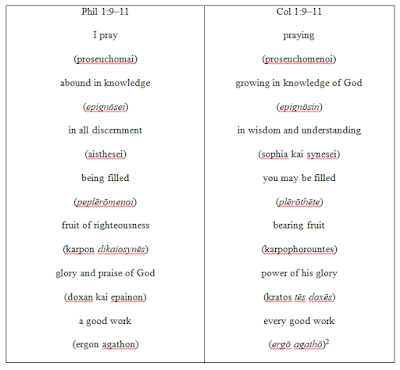Why is this chapter on Paul's prayer in Philippians 1:9-11 entitled "Overcoming the Hurdles"?
In the chapter before this one, Carson shares several excuses for not praying. If you don't have the book you can read this chapter atwww.monergism.com/thethreshold/sdg/excuses.html
In this short prayer, Paul prays for growing love, holy living, and living for God's glory.
Here is a side by side comparison from the commentary Philippians, Colossians, and Philemon by R. R. Melick. of Paul's prayers in Philippians 1:9-11 and Colossians 1:9-11. He notes that "the fact that they are parallel emphasizes the basic themes found in his requests." Paul wants the churches to grow in Christ.
love: great, growing, purposeful love.
In the chapter before this one, Carson shares several excuses for not praying. If you don't have the book you can read this chapter atwww.monergism.com/thethreshold/sdg/excuses.html
- I am too busy
- I feel too dry spiritually to pray
- I feel no need to pray.
- I am too bitter to pray
- I am too ashamed to pray.
- I am content with mediocrity
In this short prayer, Paul prays for growing love, holy living, and living for God's glory.
Here is a side by side comparison from the commentary Philippians, Colossians, and Philemon by R. R. Melick. of Paul's prayers in Philippians 1:9-11 and Colossians 1:9-11. He notes that "the fact that they are parallel emphasizes the basic themes found in his requests." Paul wants the churches to grow in Christ.
Three of Paul's requests in this passage include love, pure and blameless living and glorifying God.
- Self-sacrificial love not
- Growing because
- This love is abounding.
- This love is abounding more and more.
- This love is abounding [still] more and more. Compare ESV (And it is my prayer that your love may abound more and more, with knowledge and all discernment) and NKJV ( And this I pray, that your love may abound still more and more in knowledge and all discernment) of Philippians 1. Some translations do not include the word "still." It does appear in the original language - Greek.
Pure and blameless
- This video along with some helpful tips on reading difficult passages can be found at www.desiringgod.org/labs/i-dont-feel-blameless-am-i. Here are the tips and there is an explanation of each tip.
- Identify what is clear from the passage.
- Find the main point.
- Look for clues within the book and surrounding context.
- Cross-reference.
- Ask specific questions of the text.
- Use a trusted commentary.
Here are some of my study notes to help show the connections throughout the passage.

